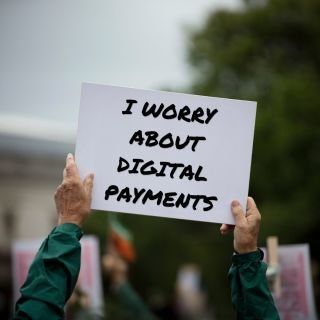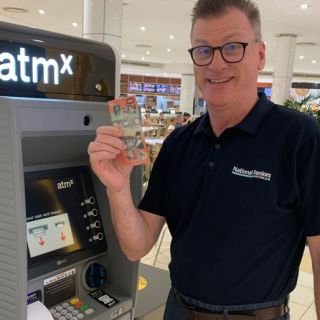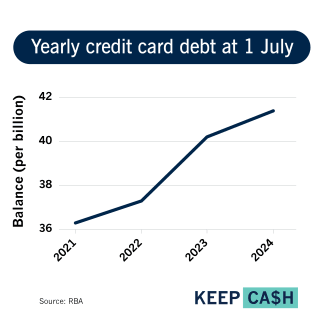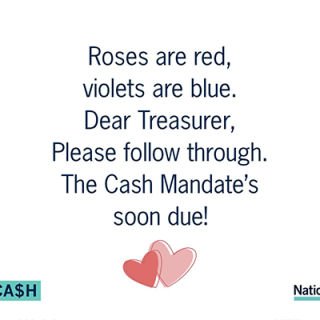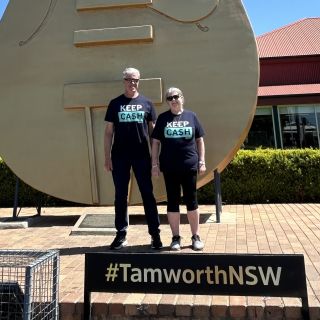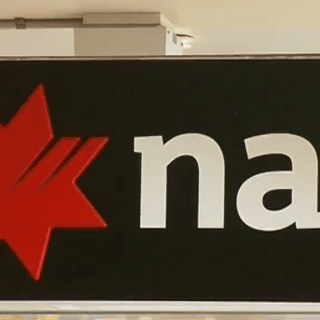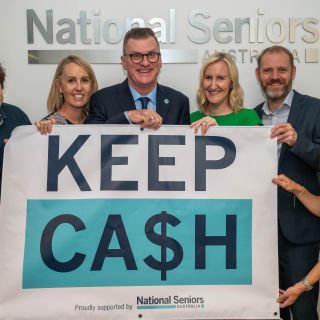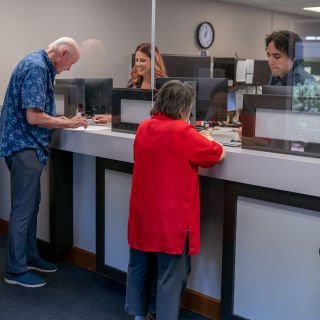Keep Cash
National Seniors is calling for cash to be accessible and accepted, to ensure seniors are not digitally excluded.

A consumer-focused approach to cash-related advocacy
CASH MANDATE
Maintaining broad acceptance of cash will be a priority going forward, including as part of the scheduled review of the cash acceptance rules.
CASH DISTRIBUTION
We advocate for proactive action to protect the cash distribution system from risks ahead of a natural disaster, outage, or similar crisis.
CASH ACCESS
We advocate for measures which will maintain access to face-to-face banking services, particularly in regional areas.
CARD SURCHARGES
NSA argues that all debit cards and the bulk of credit cards should not include surcharges.
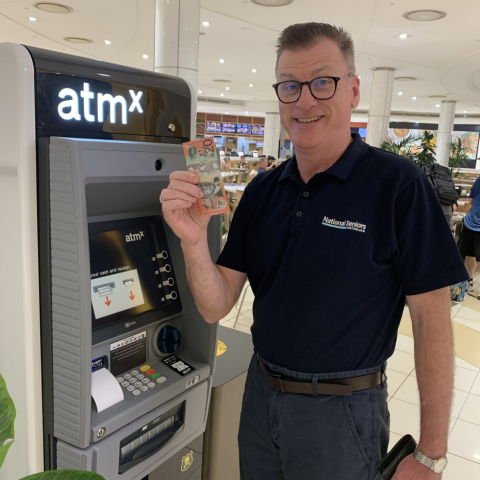
March is NSA Cash Month, and we’re inviting you to help Keep Cash in use across Australia. It’s simple – choose your own cash‑only day and use cash as much as possible when you shop.
By taking part, you’re helping us show how important cash still is for choice and accessibility. Getting cash is easy and fee‑free for millions of Australians nation-wide with atmx.
After your cash day, please take a moment to fill out our quick form so we can tally the results and share the collective impact. Photos are welcome too - we would love to see how you’re getting involved.
Together, let’s keep cash in the mix and show that it still matters.

Order your FREE Keep Cash stickers
As a crucial part of our ‘Keep Cash’ campaign, we are encouraging retailers who accept cash to display our ‘WE ACCEPT CASH’ sticker. We are also calling on community members to distribute stickers to local participating retailers.
In addition, we are encouraging supporters to display our 'Keep Cash' bumper stickers.
If you would like to order stickers, please fill out our request form linked below.

atmx and NSA partner to Keep Cash
The peak consumer body for older Australians and Australia’s largest fee-free ATM network have joined forces to ensure cash remains an accessible and viable payment option.
The partnership between National Seniors Australia (NSA) and atmx has been forged to help those who may be digitally excluded or who prefer the security and familiarity of cash.
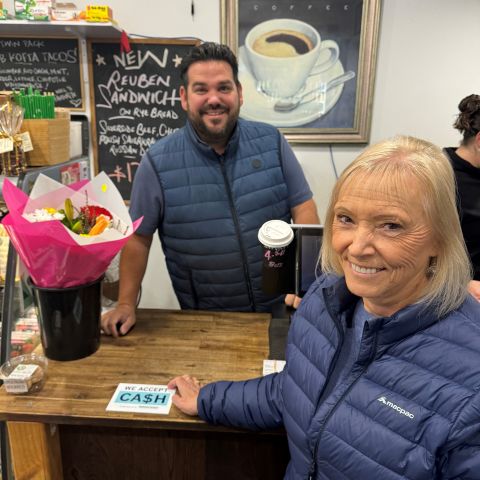
Use more cash: There needs to be more cash transactions in the system for the government, banks, and retailers to take notice and understand that cash is important, especially for the older cohort.
Subscribe to National Seniors Connect Newsletter: To keep updated on our advocacy efforts to keep cash as a valid form of currency, slow down the closure of physical branches, and ensure there is appropriate training to support seniors with digital platforms.
Follow National Seniors on Facebook and LinkedIn: In addition, share our posts to show your support and keep this important message in front of policy advisors and decision makers.
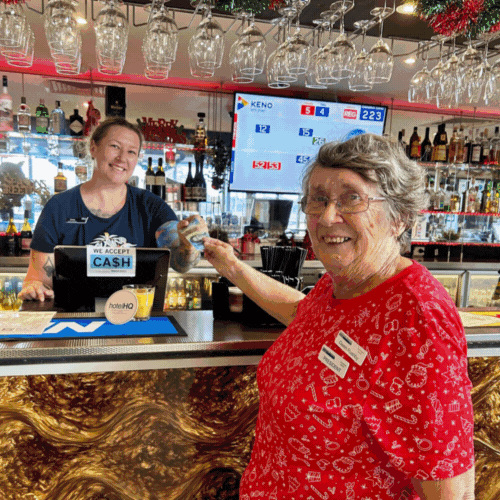
Support us in supporting you! To share with the NSA community of more than 240,000 members and supporters your support to ‘Keep cash’, while also promoting your business, we encourage you to take a photo of our sticker displayed in your store and upload it by clicking the button below.
We will list participating retailers on our website and share a selection of photos on our social media platforms. This is one way NSA can support retailers who support our members, and many older Australians, who use cash. Supporters who distribute stickers to businesses can participate too.
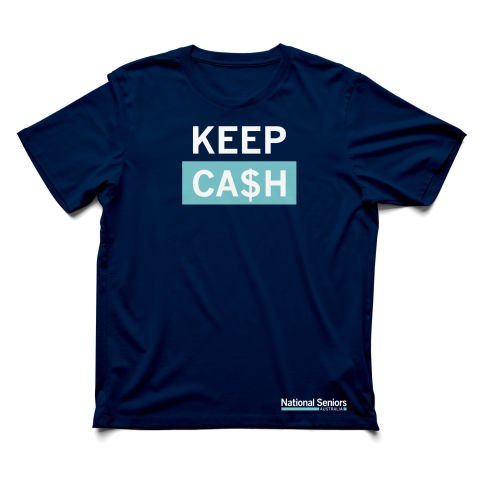
Get your own Keep Cash shirt!
Show your support for Keep Cash! Due to popular demand, we are offering you the opportunity to purchase one, or more, of our Keep Cash t-shirts. Save more when you purchase two. Be quick – the first 20 orders will receive FREE postage. Ordering is easy. For more details, or to place an order, visit our store page.

Cash Acceptance Mandate: Progress made, but there's more work ahead.
The mandate is an important step towards much needed further reform given there were no obligations for retailers to accept cash. While NSA welcomes the mandate applied to fuel and grocery retailers, as well as the continued payment of bills at Australia Post, there are many limitations and caveats that make it complex and confusing for consumers.
NSA believes the mandate should be strengthened to uphold consumer expectations and monitored to ensure it is effective. We will continue to campaign to Keep Cash accessible and accepted and we thank our growing NSA community for supporting our Keep Cash campaign – for helping to bring about this mandate – a small but critical step.
"Why would we want to give up cash? Just last week, three shops were unable to trade because their EFTPOS went down, or their WIFI wasn't working. The only person who could pay for their groceries was me because I had cash."
- Helly
"Another aspect of the move to being cashless is the relentless move by the banks to not only close branches but also remove ATMs. Added to this, the banks charge a fee for a 'tap and go' transaction. Surely, it is cheaper for businesses and banks to not have to deal with cash, so why should they charge a fee for a cost-saving?"
"Seniors, as well as those living with disability, may struggle with the transition to a cashless society with digital payment methods and technology. Many older adults are more comfortable using cash for their transactions as it’s a tangible, reliable, and familiar form of payment."
-Paisley

